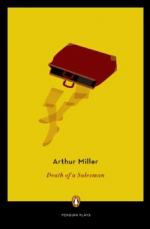|
|
Death of a Salesman Author/Context
Arthur Miller was born in New York City in 1915, the son of a manufacturer and a teacher. Miller, much like Biff in his play Death of a Salesman, was not a scholar; sports captured his attention more than academics. He was so poor a student, in fact, that once his writing became well known, many of the teachers he'd had throughout school couldn't remember who he was. Miller worked at an automobile parts factory and saved money to pay for college after he was profoundly moved by The Brothers Karamazov, which he began reading under the assumption that it was a detective novel. After reading the story, he knew he was meant to be a writer, and so he went to the University of Michigan as a journalism major. Miller said, "I was perfectly innocent of any academic knowledge, although I did know a good deal about automobiles, ice skating, and what it was to work for a living."
He graduated in 1938 and completed his first play, All My Sons, in 1947. Death of a Salesman was finished in 1949 and earned Miller a Pulitzer Prize for Drama that year as well as a New York Drama Critics Circle Award. After 742 Broadway shows the play closed, but has remained one of Miller's enduring works.
Albert A. Shea considered Death of a Salesman to be a scathing social commentary on capitalist America. Shea wrote:
Arthur Miller casts a score of darts -- at advertising, credit selling, the family automobile; at the petty larceny and the subversive attitude toward sex characteristic of our time. But his main attack is against the view that a man is a fool if he does not get something -- as much as possible -- for nothing more than a smile, being a good fellow and having good contacts.
Miller, after divorcing his first wife, married Marilyn Monroe in 1956. That same year he was called to testify before the House Un-American Activities Committee because he was suspected of Communist sympathies. Although he answered forthrightly all questions concerning his own activities, he refused to give the names of people he saw at the Communist functions he attended. This earned him a $500 fine and a suspended jail sentence of 30 days, which he never served. The Crucible, a play about the Salem Witch Trials, is a thinly veiled portrayal of the witch hunting of the McCarthy hearings. In 1960, Miller and Monroe parted ways after he wrote The Misfits (1960) for Monroe to star in. Soon after, Miller wrote his play After the Fall (1963), which is noticeably autobiographical. In 1962 Miller married his third wife, Ingeborg Morath, a photographer, and together they created In Russia, a book of Morath's photographs and a long essay by Miller. His other works include A View from the Bridge (1955), The Incident at Vichy (1964), The Creation of the World and Other Business (1972), Playing for Time (1981), Danger: Memory! (1987), The Ride Down Mount Morgan (1991), The Last Yankee (1992), Broken Glass (1994), as well as Focus (a novel), I Don't Need You Anymore (a collection of short stories), and Timebends (an autobiography).
"About Miller we can be sure of at least this much: he is one of the five or six incontestably fine writers for theater that America has produced. His position in the drama of America and, indeed, in the drama of the Twentieth Century, is both secure and high."
Bibliography
"Miller, Arthur." Biographical Dictionary. New York: Chambers Harrap Publishers Ltd., 1997.
Miller, Arthur. Death of a Salesman: Certain Private Conversations in Two Acts and a Requiem. New York: Penguin Books, 1998.
"Miller, Arthur." Modern American Literature: A Library of Literary Criticism. Vol. 2. ed. Frederick Unger. New York: Charles Scribner's Sons., 1969.
"Miller, Arthur." Twentieth Century Authors: A Biographical Dictionary of Modern Literature. Ed. Stanley J. Kunitz. New York: The H. W. Wilson Company, 1955.
"Miller, Arthur." 200 Contemporary Authors: Bio-bibliographies of Selected Leading Writers of Today with Criticism and Personal Sidelights. Ed. Barbara Harte, Carolyn Riley. Detroit: Gale Research Co., 1969.




